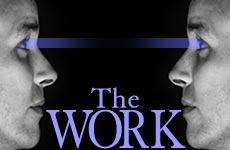 Vampire Weekend's Surprising Jewish Stories
Vampire Weekend's Surprising Jewish Stories


5 min read
Can't stand the way your boss treats you? Chances are you're guilty of the same thing.
Byron Katie's book "Loving What Is: Four Questions that Can Change Your Life" is on its way to the bestseller list and her method is fast becoming the approach of many therapists -- and for good reason: It works.
Why? It is based on two fundamental principles in the Torah.
Here's the core of what Katie calls "The Work": "Judge your neighbor, write it down, ask four questions and turn it around."
Judging someone else is really judging yourself.
Her claim is that the judgments you make of someone you're mad at, hurt by, or angry with, invariably apply to yourself. When you turn those judgments around, chances are you'll find yourself guilty of the same thing. In essence, judging someone else is really judging yourself.
For example, Sue claims that her husband, Ted, is critical. She would write down, "Ted is critical of me," and then put that statement through four questions:
Turning the statement around is the crux of the system. Katie then gently asks Sue if the statement, "Sue is critical of Ted" is as true, if not truer, than the original statement? People discover that what they see in others exists within themselves.
Katie discovered the Torah principle, "Kol hapossel, b'mumar possel" -- anyone who disparages another, disparages him with his own faults [Talmud, Kiddushin 70b].
Everything in the physical world represents a concept in the spiritual world. The condition of being colorblind is the physical counterpart of this spiritual reality that Katie describes.
Color blindness comes as a result of a lack of one or more types of color receptors in a person's eyes. If the proper color cone doesn't exist in their eye, they cannot see that color. A colorblind person can only see the colors that already exist in his own eyes.
The same applies with judgments. We only see the traits in other people that exist within us. If someone calls a person arrogant, it means he himself has arrogance within him. If he wouldn't be arrogant, he wouldn't see arrogance. Another person could see the same situation and call it something different.
Sue's initial problem, "Ted is critical," is transformed into the beginning of her own personal character development, "Where am I being critical of Ted?"
The second kernel of truth embedded in Katie's book is Judaism's principle that every event that happens is a result of God's personal supervision. Whether good or "bad," the reality each individual experiences is a gift to help a person reach their ultimate potential.
The Talmud teaches this principle in a story about Nachum Ish Gam Zu, which means "Nachum, the man who always says 'This too'". Why was he nicknamed "this too"? Because to everything that happened to him, he responded, "This too is for the best." When he lost his house, he full heartedly said, "This too is for the best." When he lost his possessions, again he happily exclaimed, "This too is for the best."
How are "bad" things for the best?
God is loving and compassionate, treating all of us like a kind father. If He 'sent' us this event, then it's good. Even if it seems painful or bitter at the time, ultimately this is the best thing that could happen to help us grow and reach our potential. God, knowing the past, present and future of our lives, does things only for our benefit.
Katie speaks of a loving God that is not out to punish people, but to teach and spur people on in their own personal growth.
"Reality rules, " Katie says repeatedly in her book, hence the title, "Loving What Is." "If it's losing money, I've been spared" claims Katie. "If I didn't get money that I thought was supposed to be mine, it means I have been spared the effects of using it wrongly." Whatever happens, from divorce to a car accident to sickness and even death, Katie sees it as a gift. She speaks of a loving God that is not out to punish people, but to teach and spur people on in their own personal growth.
"There is no such thing as verbal abuse," Katie says. "If someone calls me a liar, all I have to do is search inside myself. Have I lied? If I have, I can say, "Yes, I am a liar and thank you for pointing it out. Now I know what to work on," explains Katie, with no room for hurt feelings.
While there is much I disagree with in her book -- like her take on the nature of Truth -- Katie has inadvertently tapped into some age-old Torah principles that are effective in deepening one's understanding of self and creating a life of happiness and inner peace. Now let's get to work.
LOVING WHAT IS, BY BYRON KATIE.
